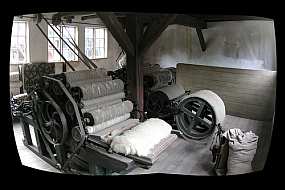Most people have never considered the ideas I will be presenting this week. I don’t think I’ve ever seen anyone write on this subject (apart from me), either from a Christian or secular perspective. I believe with all my heart that what I write here today and in days to come is key to understanding nearly every issue facing modern society, and it explains much of Western Christianity’s history since 1820. Most of all, it helps us Christians understand how we must face the past to work toward a better future.
This is not a happy post, but one that might anger some. I know because I discussed elsewhere some of the issues raised covered here and people have reacted strongly. We do not want to face our failings. Humility does not come easily to us. But unless we understand the broken past, we will forever base our perceptions of the world on a flawed foundation.
Cerulean Sanctum, as a blog, covers issues facing the American Church. For the purposes of this post, we’ll expand that to include the West, England in particular. The story of how three social, intellectual, and theological changes rocked the Christian world and forever altered how we live, starts in that country.
And it does so, appropriately enough, with hot water.
Thomas Newcomen invented the steam engine, James Watt made it workable, and Richard Trevithick perfected its practicality for a number of small-scale uses. The advent of steam power combined with the growing use of machinery to enable mass produced goods. In England, the textile industry’s growing automation married the steam engine, which led to the increased use of powered machines in manufacturing. With iron foundries flourishing from the switch from coal to coke comes the first great wave of the industrial revolution in the early 19th century.
But the industrial revolution was not the first revolution of its kind in England. The agricultural revolution preceded it. Fat from the slave trade and its unusual abundance of resources and dense population, growing capitalism in England essentially stamped out the last vestiges of feudalism. Land ownership increased among the lower-middle class and poor. Better farming techniques raised production levels. Soon, the agricultural revolution in the English countryside spawned what was known as cottage industry. Farms churned out textiles and other goods produced in the home for sale on the wider market. This continued to build wealth among people without access to family estates. Boom times came to the whole of England.
Yet just as cottage industry was swelling the coffers of rural inhabitants, competition arrived in the form of the modern factory.  Powered by steam, driven by iron machines that churned out goods faster than the home workers in the country could match, factories assaulted the agricultural revolution, laying waste to the shared wealth that cottage industry provided. The industrial revolution’s relentless march concentrated wealth in the hands of the few and created what would become a tragic revisiting of feudalism in England.
Powered by steam, driven by iron machines that churned out goods faster than the home workers in the country could match, factories assaulted the agricultural revolution, laying waste to the shared wealth that cottage industry provided. The industrial revolution’s relentless march concentrated wealth in the hands of the few and created what would become a tragic revisiting of feudalism in England.
As cottage industry shriveled in the wake of industrialism, the youth of the countryside, seeing their future livelihoods threatened, abandoned the farm in droves for the promise of the factory. But as Charles Dickens would document in his novel Hard Times, the promise proved a lie. The factories, rather than doling out success, oppressed those who chose to work them. Sadly, as the youth went, so did the family farm. Without youthful labor, many families could no longer work the land and sold out to larger landowners or endured a form of indentured servitude to the same. Soon, entire families (and even villages) were forced into the factories. Destitute and manipulated by the wealthy factory owners, these farmers-turned-factory-workers became the new underclass.
Seeing this drastic change, the intelligentsia of England formulated a well-meaning but devastating question: How was it that some people prospered while others did not? The question dominated the parlors of mid-19th century England, spilling over into one of the bastions of thought, the Church. (This question will later have great ramifications for Christians, as we will see.)
Hard Times notes another trend in England of the 1850s. With the industrial revolution in full swing, England’s success piggybacked on the practical application of science. After all, applications of facts led to the invention of the devices that powered the factories. Facts were king, and science provided the answers that became fact. That thirst for fact based in science opened a large door, for the year that brought Hard Times yielded another book, On the Origin of Species by Charles Darwin.
Contrary to what some might believe, the powerful idea in Darwin’s book that would forever engrave it in the modern psyche was not evolution, but the concept of the survival of the fittest. On the Origin of Species used science to explain the question of why some prospered and some did not. Those that did not were simply unfit to compete.
The intelligentsia drew the next application of the fact of the survival of the fittest, therein solving the riddle of the underclass: Not all men are created equal.
This application of Darwin, what would become known as social Darwinism, would soon find its way into the Church and manifest in a most unusual bifurcation, as we will see in the days ahead.
By the 1870s, the industrial revolution had kicked into high gear, with steam-powered vehicles crisscrossing the planet. This opened distant lands to travel. As the ability to move about the planet increased, so did empires. For the wealthiest, it afforded more opportunity to plunder and grow richer. To them, it was a golden age, where the sun never set on the Empire, and the world was rife with possibilities.
The Church, seizing on what it saw as a Golden Age of Triumph, reinterpreted its eschatology to fit. The result reinvigorated postmillennialism, the school of thought that (in a nutshell) has the Church handing over a perfected earthly kingdom to Christ. Christians would invest their wealth and fix all the problems of the world through science, education, art, and the aesthetics of high culture, to be rewarded for their labors by the Master at His Second Advent.
Postmillennialism swept away most other schools of eschatological thought in the years between 1850 and 1929. It proved the backbone of the abolitonist movement, with many Christian abolitionists seeing slavery as a key impediment to delivering a perfected world to the Savior. All social evils fell under the withering gaze of postmillenialists, with social responsibility coming to the fore. Enduring institutions like the Salvation Army and my alma mater, Wheaton College (with its postmillenial motto of “For Christ and His Kingdom”), formed in this time period, fueled by the triumphalism of the age.
Few Christians would understand, though, that the triumph was instead a fatal miscalculation.
I firmly believe that industrialism, social Darwinism, and postmillennialism collided, creating a perfect storm that washed away key parts of the foundation that had supported the modern Church since the Reformation. In Part 2, I will explain how these three caught the Church asleep, damaged Western Christianity, and resulted in societal changes that the Church has been fighting fruitlessly ever since.
Thanks for reading. Next part in the series…

 I grew up in what was a brand new subdivision in 1972. We were one of the first residents of that new neighborhood, watching houses go up and people move in. A mostly Catholic neighborhood developed with us Lutherans and the AoG pastor at the end of the street.
I grew up in what was a brand new subdivision in 1972. We were one of the first residents of that new neighborhood, watching houses go up and people move in. A mostly Catholic neighborhood developed with us Lutherans and the AoG pastor at the end of the street.